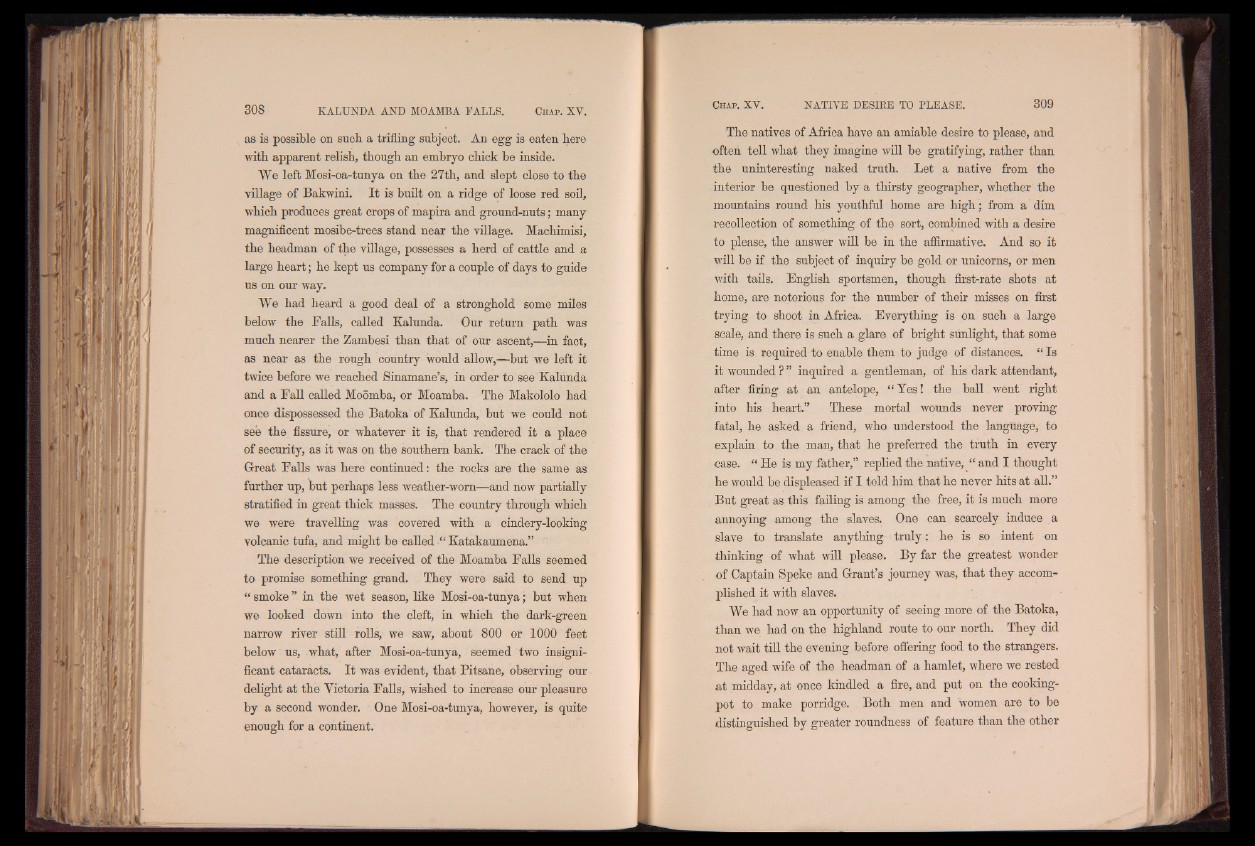
as is possible on such a trifling subject. An egg is eaten here
with apparent relish, though an embryo chick be inside.
We left Mosi-oa-tunya on the 27th, and slept close to the
village of Bakwini. It is built on a ridge of loose red soil,
which produces great crops of mapira and ground-nuts; many
magnificent mosibe-trees stand near the village. Machimisi,
the headman of the village, possesses a herd of cattle and a
large heart; he kept us company for a couple of days to guide
us on our way.
We had heard a good deal of a stronghold some miles
below the Falls, called Kalunda. Our return path was
much nearer the Zambesi than that of our ascent,—in fact,
as near as the rough country would allow,—but we left it
twice before we reached Sinamane’s, in order to see Kalunda
and a Fall called Moomba, or Moamba. The Makololo had
once dispossessed the Batoka of Kalunda, but we could not
see the fissure, or whatever it is, that rendered it a place
of security, as it was on the southern bank. The crack of the
Great Falls was here continued: the rocks are the same as
further up, but perhaps less weather-worn—and now partially
stratified in great thick masses. The country through which
we were travelling was covered with a cindery-looking
volcanic tufa, and might be called “ Katakaumena.”
The description we received of the Moamba Falls seemed
to promise something grand. They were said to send up
“ smoke ” in the wet season, like Mosi-oa-tunya; but when
we looked down into the cleft, in which the dark-green
narrow river still rolls, we saw, about 800 or 1000 feet
below us, what, after Mosi-oa-tunya, seemed two insignificant
cataracts. I t was evident, that Pitsane, observing our
delight at the Victoria Falls, wished to increase our pleasure
by a second wonder. One Mosi-oa-tunya, however, is quite
enough for a continent.
The natives of Africa have an amiable desire to please, and
often tell what they imagine will be gratifying, rather than
the uninteresting naked truth. Let a native from the
interior be questioned by a thirsty geographer, whether the
mountains round his youthful home are high ; from a dim
recollection of something of the sort, combined with a desire
to please, the answer will be in the affirmative. And so it
will be if the subject of inquiry be gold or unicorns, or men
with tails. English sportsmen, though first-rate shots at
home, are notorious for the number of their misses on first
trying to shoot in Africa. Everything is on such a large
scale, and there is such a glare of bright sunlight, that some
time is required to enable them to judge of distances. “ Is
it wounded ? ” inquired a gentleman, of his dark attendant,
after firing at an antelope, “ Yes! the ball went right
into his heart.” These mortal wounds never proving
fatal, he asked a friend, who understood the language, to
explain to the man, that he preferred the truth in every
case. “ He is my father,” replied the native, “ and I thought
he would be displeased if I told him that he never hits at all.”
But great as this failing is among the free, it is much more
annoying among the slaves. One can scarcely induce a
slave to translate anything tru ly : he is so intent on
thinking of what will please. By far the greatest wonder
of Captain Speke and Grant’s journey was, that they accomplished
it with slaves.
We had now an opportunity of seeing more of the Batoka,
than we had on the highland route to our north. They did
not wait till the evening before offering food to the strangers.
The aged wife of the headman of a hamlet, where we rested
a t midday, at once kindled a fire, and put on the cooking-
pot to make porridge. Both men and women are to be
distinguished by greater roundness of feature than the other